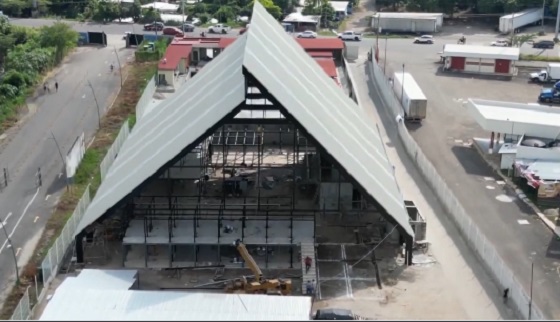Great Reset
A One-Stop Shop for Illegal Migration Reveals Ongoing Plans for Illegal Immigration

From the Center for Immigration Studies
By Todd Bensman
UN/NGO ‘mall’ under construction in southern Mexico shows they expect continued illegal flow to the U.S.
A 75,000-square-foot mega-mall, built to enable industrial-scale illegal immigration to the U.S. southern border, is almost online here in this key entry city in southern Mexico just across the border from Guatemala.
Scheduled to open in December, the mall suggests that powerful global agencies, the United Nations key among them, are bullish on a long-term future of continued heavy U.S.-bound illegal migrant traffic through Mexico – no matter the outcome of the November 5 American presidential election.
Those bullish investors are the dozens of migration-oriented UN agencies and non-governmental organizations (NGOs) that have already plowed hundreds of millions of dollars of U.S. taxpayer money into constructing a permanent network of way stations for thousands of miles along the migration routes from South America to the U.S. border during the four years of the Biden-Harris administration.

A Nicaraguan on his way to the U.S. showed his UN cash card in Monterrey, Mexico. January 2023 photo by Todd Bensman.
The record hundreds of millions of dollars in aid is distributed at the way station network in the form of cash cards, cash in envelopes, food, vouchers for onward travel and lodging, medical treatment, pharmaceuticals, legal counseling, and much more. (See: “UN Budgets Millions for U.S.-Bound Migrants in 2024”.) This aid has without doubt helped the UN and its growing constellation of NGOs keep the masses moving north through Tapachula in record numbers toward irresistible Biden border policies that have welcomed across arrivals in historic millions. (See: “Biden Admin. Sends Millions to Religious Nonprofits Facilitating Mass Illegal Migration”.)
The UN and NGOs are betting on a busy future in Mexico. Going forward, the purpose of this one strategically located facility is to “respond comprehensively to the needs of people who arrive in Mexico … migrant refugees who travel together from all continents, and arrive in Tapachula in need of a response or attention”, Giovanni Lepri, the Mexico representative for the United Nations High Commission on Refugees (UNHCR), told reporters when Mexico’s foreign ministry announced it in April 2024.
But the Tapachula mall represents a far more expansive billion-dollar migration-route safety net constructed during the Biden-Harris years using record-breaking U.S. taxpayer contributions.
It plugs into two other big one-stop-migration malls erected in the northern Mexico cities of Monterrey and Tijuana. These gleaming new Mexican facilities, and plenty of other UN and NGO substations in Mexican towns and cities, form the final terminus of the trails to the United States lined with pots of U.S. taxpayer money. And they are representative of what’s happening throughout Latin America.
The UN High Commissioner for Refugees (UNHCR), which received $1.9 billion in U.S. taxpayer funds in 2024 and $2.1 billion in 2023 (compared to $377 million in 2019) for migration assistance throughout Latin America, started building the Tapachula facility on land donated by Chiapas State as part of the deal with Mexico to run it.
The UNHCR, UN’s International Organization for Migration (IOM), UNICEF, and dozens of private, often religion-based, NGOs scattered around Tapachula will work alongside one another under one massive roof here — evidently planning a years-long collaboration.
None of the UN/NGO pots of gold are exactly a secret but are relatively hard to find for the uninitiated. And harder to grasp as connected to domestic American policies or as a legitimate point of political debate.
The UN’s 2024 update to the “Regional Refugee and Migrant Response Plan” (RMRP for short), a UNHCR and IOM planning and budget document, lays out in detail that it planned to hand out nearly $1.6 billion in 17 Latin America countries using its network of 248 different NGOs. (For the complete list of involved groups, see p. 268, here, and explore their activities further with this interactive tool).
That was on top of the 2023-2024 RMRP plan, which called for 228 NGOs (all listed on p. 268 of the list of involved groups) to spend $1.72 billion on trailside assistance to mass migration that all know will illegally pass through many countries and, finally, breach the U.S. border.
Hundreds of millions of dollars for all of this comes straight from U.S. taxpayers in the form of sharply increased US State Department bequeathals, USAID grants, and flexible spending contributions to the UNHCR and IOM.
Too Far for Average Americans to See

Necocli, Columbia to Acandi, Panama
For an idea of how U.S. tax money is spent to flood the American border, the far northwest Colombian town of Necocli provides a window. This is a major staging town for migrants preparing to boat across the Gulf of Uraba for smuggler-guided backpack trips through the so-called “Darien Gap” jungle passage that leads into Panama and eventually Mexico.
In Necocli, the UN and NGO agencies have arrayed themselves in something like an outdoor swap meet of NGO booths and an IOM mobile bus office on a few acres next to the gulf beach, the Center for Immigration Studies observed during an August 2024 research trip to the region. The Jewish NGO Cadena was set up in a booth next to the Adventist Development and Relief Agency (ADRA).
NGO and UN workers there said they provide a variety of trail advice — and plenty of supplies to the immigrants, to include socks, underwear, backpacks, bug repellant, water filters, sunscreen, and Vaseline.
And food.
“Like things easy to carry so they can eat and be done with it,” a Cadena worker said.
ADRA provides children’s classes thrice weekly on how to avoid sexual predators among the strange men traveling the Darien Gap.
On this day, a Cadena worker said she’d given out thousands of food items such as packaged soup to more than 3,000 migrants during the previous few months, showing the last of it: a box with a handful of granola bars she hoped to hand out soon so she could go home.
What about critics who say NGOs like Cadena are helping migrants break the laws of many countries?

A Cadena NGO worker in Necocli, Colombia. August 2024 photo by Todd Bensman.
“As an organization,” the Cadena worker responded. “We’re not here to judge. We’re just here to provide a service.”
”But aren’t you helping them migrate?”
“Only by giving them the things that I mentioned, not money or fare, just certain resources for the trip,” she explained.
UNHCR workers carrying iPads interacted with groups of migrants sitting in chairs under open-air shelters, surveying them and their needs for the trail ahead. The IOM workers hand out hygiene kits to women, but had run out of the kits some days earlier.
Across the Uraba Gulf in the staging town of Acandi, the Clan del Gulfo paramilitary controls the human smuggling operations into the Darien Gap. The cartel runs two migrant camps where the migrants are brought for final journey preparations.
The center gained permission to access one of the camps, “Camp 1”. Inside, the Center found NGOs providing medical services, legal counseling, and food.
Furthermore, Colombian banks also have been allowed to set up a money-wiring service so that migrants could pay their foot guides.
All involved could not possibly be unaware that the people they are assisting intend to break the immigration laws of a half dozen countries up trail, including, ultimately, illegally breaching the American border.
A Bright Future for Mass Migration?
The UN and NGO’s migration advocacy industrial complex is now preparing its 2025-2026 plan for the trails of Latin America.
A request for input from its NGO partners suggests an ambitious coming year of providing “cash and voucher assistance”, “food security”, “humanitarian transportation”, “shelter”, and most other basic human needs.
Who will be the recipients?
Refugees and migrants in-transit (of all nationalities) who cross an international border.
Brownstone Institute
The Doctor Will Kill You Now

From the Brownstone Institute
Way back in the B.C. era (Before Covid), I taught Medical Humanities and Bioethics at an American medical school. One of my older colleagues – I’ll call him Dr. Quinlan – was a prominent member of the faculty and a nationally recognized proponent of physician-assisted suicide.
Dr. Quinlan was a very nice man. He was soft-spoken, friendly, and intelligent. He had originally become involved in the subject of physician-assisted suicide by accident, while trying to help a patient near the end of her life who was suffering terribly.
That particular clinical case, which Dr. Quinlan wrote up and published in a major medical journal, launched a second career of sorts for him, as he became a leading figure in the physician-assisted suicide movement. In fact, he was lead plaintiff in a challenge of New York’s then-prohibition against physician-assisted suicide.
The case eventually went all the way to the US Supreme Court, which added to his fame. As it happened, SCOTUS ruled 9-0 against him, definitively establishing that there is no “right to die” enshrined in the Constitution, and affirming that the state has a compelling interest to protect the vulnerable.
SCOTUS’s unanimous decision against Dr. Quinlan meant that his side had somehow pulled off the impressive feat of uniting Antonin Scalia, Ruth Bader Ginsberg, and all points in between against their cause. (I never quite saw how that added to his luster, but such is the Academy.)
At any rate, I once had a conversation with Dr. Quinlan about physician-assisted suicide. I told him that I opposed it ever becoming legal. I recall he calmly, pleasantly asked me why I felt that way.
First, I acknowledged that his formative case must have been very tough, and allowed that maybe, just maybe, he had done right in that exceptionally difficult situation. But as the legal saying goes, hard cases make bad law.
Second, as a clinical physician, I felt strongly that no patient should ever see their doctor and have to wonder if he was coming to help keep them alive or to kill them.
Finally, perhaps most importantly, there’s this thing called the slippery slope.
As I recall, he replied that he couldn’t imagine the slippery slope becoming a problem in a matter so profound as causing a patient’s death.
Well, maybe not with you personally, Dr. Quinlan, I thought. I said no more.
But having done my residency at a major liver transplant center in Boston, I had had more than enough experience with the rather slapdash ethics of the organ transplantation world. The opaque shuffling of patients up and down the transplant list, the endless and rather macabre scrounging for donors, and the nebulous, vaguely sinister concept of brain death had all unsettled me.
Prior to residency, I had attended medical school in Canada. In those days, the McGill University Faculty of Medicine was still almost Victorian in its ways: an old-school, stiff-upper-lip, Workaholics-Anonymous-chapter-house sort of place. The ethic was hard work, personal accountability for mistakes, and above all primum non nocere – first, do no harm.
Fast forward to today’s soft-core totalitarian state of Canada, the land of debanking and convicting peaceful protesters, persecuting honest physicians for speaking obvious truth, fining people $25,000 for hiking on their own property, and spitefully seeking to slaughter harmless animals precisely because they may hold unique medical and scientific value.
To all those offenses against liberty, morality, and basic decency, we must add Canada’s aggressive policy of legalizing, and, in fact, encouraging industrial-scale physician-assisted suicide. Under Canada’s Medical Assistance In Dying (MAiD) program, which has been in place only since 2016, physician-assisted suicide now accounts for a terrifying 4.7 percent of all deaths in Canada.
MAiD will be permitted for patients suffering from mental illness in Canada in 2027, putting it on par with the Netherlands, Belgium, and Switzerland.
To its credit, and unlike the Netherlands and Belgium, Canada does not allow minors to access MAiD. Not yet.
However, patients scheduled to be terminated via MAiD in Canada are actively recruited to have their organs harvested. In fact, MAiD accounts for 6 percent of all deceased organ donors in Canada.
In summary, in Canada, in less than 10 years, physician-assisted suicide has gone from illegal to both an epidemic cause of death and a highly successful organ-harvesting source for the organ transplantation industry.
Physician-assisted suicide has not slid down the slippery slope in Canada. It has thrown itself off the face of El Capitan.
And now, at long last, physician-assisted suicide may be coming to New York. It has passed the House and Senate, and just awaits the Governor’s signature. It seems that the 9-0 Supreme Court shellacking back in the day was just a bump in the road. The long march through the institutions, indeed.
For a brief period in Western history, roughly from the introduction of antibiotics until Covid, hospitals ceased to be a place one entered fully expecting to die. It appears that era is coming to an end.
Covid demonstrated that Western allopathic medicine has a dark, sadistic, anti-human side – fueled by 20th-century scientism and 21st-century technocratic globalism – to which it is increasingly turning. Physician-assisted suicide is a growing part of this death cult transformation. It should be fought at every step.
I have not seen Dr. Quinlan in years. I do not know how he might feel about my slippery slope argument today.
I still believe I was correct.
Digital ID
Toronto airport requests approval of ‘digital IDs’ for domestic airport travel

From LifeSiteNews
A few months ago, the Canadian government hired outside consultants who will be tasked with looking into whether or not officials should proceed with creating a digital ID system for all citizens and residents.
Canadian airport officials asked the federal government to implement a digital ID for domestic travelers as an option in the name of “modernization.”
Currently, domestic travelers are only required to use physical identification for air travel, including a driver’s license, passport, or government-issued ID card.
However, Toronto’s Pearson International Airport recently recommended that Canada’s Secure Air Travel Regulations be amended to allow for “digital ID to be recognized.”
“To modernize and support enhanced passenger experience, we ask that the government endorse system-wide border and screening modernization including immediate regulatory changes,” Pearson representatives told Canada’s House of Commons finance committee in a recent submission.
Airport managers wrote that “Canada should proactively embrace both emerging and proven technologies that have the potential to enhance the passenger experience and improve operational efficiency and promote productivity across the sector.”
“Key initiatives should include accelerating the adoption of a common digital ID for both domestic and international travel.”
The Canadian Airports Council also told Parliament that a national digital ID program should start with airport travelers, including the introduction of “biometrics.”
The Council asked to “enable digital ID and biometrics in air travel” to allow it to “enable more efficient use of space, reduce pressure on infrastructure and enhance security.”
“At present, Canada is behind our international peers in ensuring travel process security screening, Customs and border procedures and boarding are modern, efficient, simple and biometrically based,” it wrote.
Only non-Canadians are currently mandated to undergo biometric screening as well as fingerprint scans when they enter Canada.
To date, Parliamentary committees have shot down requests for a domestic national identification system.
Some nations, such as the United Kingdom, have recently said they will mandate digital ID using the pretext of illegal immigration as the catalyst.
As reported by LifeSiteNews a few months ago, the Canadian government hired outside consultants who will be tasked with looking into whether or not officials should proceed with creating a digital ID system for all citizens and residents.
Canada’s Privy Council research from 2023 noted that there is strong public resistance to the use of digital IDs to access government services.
Prime Minister Mark Carney has a history of backing central bank digital currencies and supported in 2023 “choking off the money” donated to the Freedom Convoy protests against COVID mandates.
As late as February, the Liberal government under former Prime Minister Justin Trudeau’s immigration ministry, as reported by LifeSiteNews, was secretly asking Canadians via surveys if they would accept a national identification program that would likely end up requiring each citizen to always have a type of “digital” passport on them.
While the Liberal government under Trudeau insisted the program would be optional, Conservative leader Pierre Poilievre nonetheless sounded the alarm by promising to introduce a bill that would “expressly prohibit” digital IDs in Canada.
Digital IDs and similar systems have long been pushed by globalist groups like the World Economic Forum, an organization with which Carney has extensive ties, under the guise of ease of access and security.
Critics, however, have warned that the purpose of such a system is actually to centralize control over citizens. This opinion seems to be mirrored by the general public, with a Bank of Canada survey finding that Canadians are very wary of a government-backed digital currency, concluding that a “significant number” of citizens would resist the implementation of such a system.
-

 Health2 days ago
Health2 days agoNew report warns WHO health rules erode Canada’s democracy and Charter rights
-

 Business18 hours ago
Business18 hours agoEmission regulations harm Canadians in exchange for no environmental benefit
-

 Courageous Discourse16 hours ago
Courageous Discourse16 hours agoNo Exit Wound – EITHER there was a very public “miracle” OR Charlie Kirk’s murder is not as it appears
-

 Energy2 days ago
Energy2 days agoMinus Forty and the Myth of Easy Energy
-

 Business18 hours ago
Business18 hours agoQuebecers want feds to focus on illegal gun smuggling not gun confiscation
-

 Business2 days ago
Business2 days agoUS government buys stakes in two Canadian mining companies
-

 National15 hours ago
National15 hours agoPolitically Connected Canadian Weed Sellers Push Back in B.C. Court, Seek Distance from Convicted Heroin Trafficker
-

 Fraser Institute2 days ago
Fraser Institute2 days agoMétis will now get piece of ever-expanding payout pie







